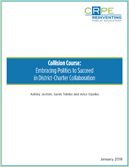Many who attempt district-charter collaboration point to “politics” as a constraint that affects their work, but little is understood about why some collaborations enjoy broad support while others become mired in conflict. Drawing upon CRPE’s multiyear study of district-charter collaborations in dozens of cities as well as research on other cross-sector initiatives, this report explores how politics shapes collaboration and offers strategies to help education leaders improve their chances of success. The report finds:
- District-charter collaborations are inherently political. These efforts can succeed only if both sides see it to their advantage to work together.
- Not all cities are well poised politically for collaboration. Declining enrollment, a weak charter sector, and unfavorable community politics can undermine district-charter work on common goals.
- Mutual wins and shared values may offer a sweet spot where collaboration can take root. District-charter collaborations have been more likely to find success when the sectors found it in their interests to work together, not because either made a one-sided sacrifice.
Recommendations for district and charter leaders, state policymakers, and philanthropists to help district-charter collaboration succeed
To help districts and states navigate the challenging politics of district-charter collaborations, this report offers the following strategies:
- District and charter leaders should understand that overcoming the political challenges of collaboration demands savvy leadership and active coalition building. This means cultivating leaders who can work across the district-charter divide, strengthening support among influencers such as mayors and community groups, and identifying bargaining chips that can bring even the most reluctant partners along.
- State policymakers can increase the likelihood that district-charter collaborations find success by reducing or eliminating disincentives to work together. This includes developing a strategy for addressing the financial challenges faced by districts struggling with declining enrollment.
- Philanthropists can support locally driven collaboration initiatives in cities where district and charter leaders have established cooperative relationships—and even in places where they have not. But funders should also be cautious about pushing prematurely for ambitious reform proposals, as their presence can trigger opposition from national advocacy groups and reduce opportunities for problem solving.





